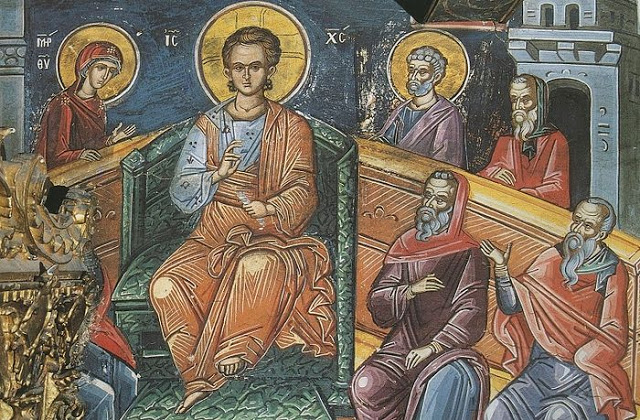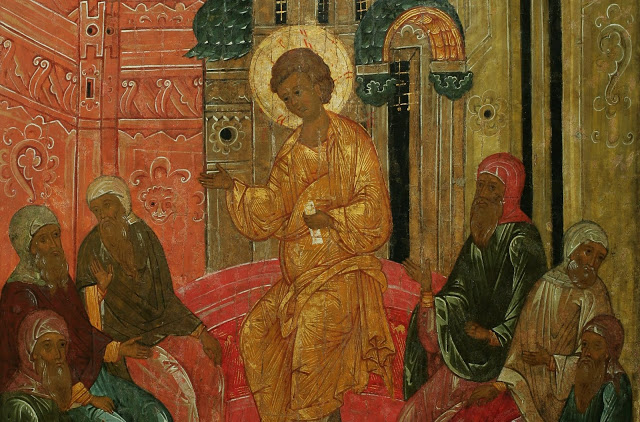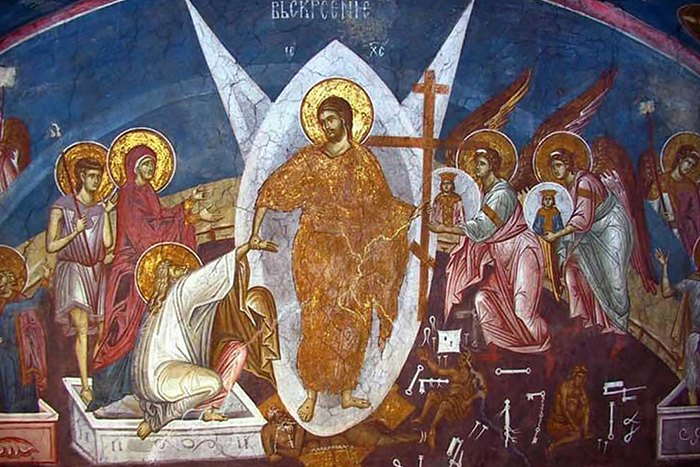
And the child grew, and waxed strong in spirit, filled with wisdom: and the grace of God was upon him. (Luke 2:40)
We know almost nothing about the early years of our Savior’s life. Holy Evangelists don’t say anything about it, so it might have been God’s will for the earliest years of Jesus Christ to remain hidden. The silence kept by canonical Gospels led many religiously unstable people in the first centuries of the existence of the Holy Church to concoct fake stories about our Savior’s childhood. The stories are teeming with nonsensical miracles and evident inventions of their authors, which serves to confirm that they’re fake and have no bearing on the genuine Church tradition.
Uninformed minds and hearts always yearn for miracles, and the more miracles they hear about, the better. People like those have a hard time accepting the simple words of Evangelist Luke, And the child grew, and waxed strong in spirit, filled with wisdom: and the grace of God was upon him (Luke 2:40). That’s all there is! The Lord came into the world not to perform countless miracles but rather to minister, and to give his life a ransom for many (Matthew 20:28).
This is why we have no idea of the early years of Jesus’s life: it has nothing to do with our salvation. The Lord lived like a human child, hiding His Messianic dignity and divine nature from people and waiting until He finally made Himself known and began His redemptive ministry.
Jesus is God, so how could He grow up and wax strong in spirit? How could He become filled with wisdom, given that God already possesses full knowledge and perfection? That’s what Saint Cyril of Alexandria, a great saint, a pillar of Orthodox faith and a Doctor of the Church, responds to these questions:
“To say that the child grew, and waxed strong in spirit, being filled with wisdom, and the grace of God was upon Him, must be taken as referring to His human nature. And examine, I pray you, closely the profoundness of the dispensation: the Word endures to be born in human fashion, although in His divine nature He has no beginning nor is subject to time: He Who as God is all perfect, submits to bodily growth: the Incorporeal has limbs that advance to the ripeness of manhood: He is filled with wisdom Who is Himself all wisdom. And what say we to this? Behold by these things Him Who was in the form of the Father made like unto us: the Rich in poverty: the High in humiliation: Him said to “receive,” Whose is the fulness as God. So thoroughly did God the Word empty Himself! For what things are written of Him as a man shew the manner of the emptying. For it were a thing impossible for the Word begotten of God the Father to admit ought like this into His own nature: but when He became flesh, even a man like unto us, then He is born according to the flesh of a woman, and is said also to have been subject to the things that belong to man’s state: and though the Word as being God could have made His flesh spring forth at once from the womb unto the measure of the perfect man, yet this would have been of the nature of a portent: and therefore He gave the habits and laws of human nature power even over His own flesh” (Exegesis on the Gospel according to Luke).

We know of precisely one story from the life of a twelve-year-old Jesus accounted of in a canonical Gospel. The story goes that Saint Joseph the Betrothed and the most holy Virgin Mary were on their way home after celebrating Passover in Jerusalem. They were thinking that Jesus was traveling with His other relatives but He wasn’t. They had lost the young Jesus in Jerusalem. They had to return and spent three days looking for Him until they finally found Him in the Temple, sitting in the midst of the doctors, both hearing them, and asking them questions. And all that heard him were astonished at his understanding and answers. And when they saw him, they were amazed: and his mother said unto him, Son, why hast thou thus dealt with us? behold, thy father and I have sought thee sorrowing. And he said unto them, How is it that ye sought me? wist ye not that I must be about my Father’s business? And they understood not the saying which he spake unto them. (Luke 2:46-50).
His response implicitly communicates the fact that He is extremely close to the Heavenly Father because the Jews never dared to call God “my Father”. If they had to use the word Father to indicate God, they would always say Our Father or Our Father in Heaven.
Mary and Joseph, like other disciples of Christ, didn’t understand His words and actions during the first years of His ministry up to the point at which the Savior finally accomplished the purpose of His coming to the world. The Lord poured out the Holy Spirit on the great day of the Pentecost on His disciples and apostles, laying the foundation of his Church and essentially making us the Father’s children who worship Him in Spirit and in Truth and call Him Abba, Father (See Mark 14:36).
We can figure out certain biographical facts of the Savior’s life prior to His public ministry only putatively. We read in the life of the Holy Apostle Judas, son of James, that Joseph the Betrothed decided at his deathbed to divide his land among his sons from his first marriage and Jesus, Son of Mary. However, the older brothers, including Judas Thaddaeus, vehemently opposed the father’s decision. Only James, the Lord’s brother, was inclined to share his part with Jesus. When Lebbaeus Thaddaeus (Judas Thaddaeus’ alternative name) found out that Jesus truly was the promised Messiah, he was really sorry for his past actions. The Lord later chose him as one of the Twelve Apostles but Lebbaeus, forever ashamed of his sin, never dared to call himself the Lord’s brother, like James. Instead, he referred to himself as Judas the brother of James.
Biblical scholars still argue about the lineage of Lebbaeus Thaddaeus and whether he really was James’s brother or son. Medieval authors tended to confuse him with James the son of Alphaeus. It is also dubious that Jesus could have inherited any property from Joseph. The Lord himself claimed, Foxes have holes, and birds of the air have nests; but the Son of man hath not where to lay his head (Luke 9:58). It is hardly likely that Joseph, who was a simple carpenter from the poor village of Nazareth, had enough land to divide it among his sons. Joseph was so poor that he was allowed to bring only two doves to the Temple as the offering for Mary’s purification as prescribed by the Law of Moses.
Therefore, we should treat even those stories that we read in the lives of the Apostles clearheadedly and cautiously, especially if they contradict the Word of God somehow.
Given that the Holy Evangelists didn’t leave us any memories or details about the Savior’s childhood and adolescence years, while various narratives of the life of Jesus prior to His public ministry don’t always tally with the absolute authority of the Holy Scripture, we can safely assume that Jesus lived a modest life in Nazareth with His most holy Mother and the righteous Joseph. The Scripture says that Jesus was subject unto them (Luke 2:51). Following His own commandment of honoring one’s parents, He helped Joseph and learned to be a carpenter. Let us follow the Lord’s example and hearken to the words of Apostle Paul, Children, obey your parents in the Lord: for this is right. Honor thy father and mother; which is the first commandment with promise; that it may be well with thee, and thou mayest live long on the earth. And, ye fathers, provoke not your children to wrath: but bring them up in the nurture and admonition of the Lord. (Ephesians 6:1-4).



